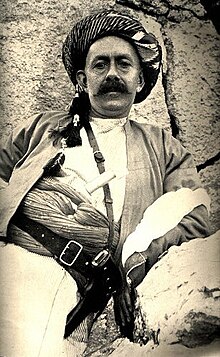| Sheikh Mahmud Barzanji شێخ مهحموود | |
|---|---|
| Şêx Mehmûdê Berzencî Sheikh Mahmud Barzanji[1] | |
 | |
| King of Kurdistan | |
| Reign | September 1921 - July 1924 |
| Predecessor | Office established |
| Born | 1878 Sulaymaniyah, Mosul Vilayet, Ottoman Iraq, Ottoman Empire |
| Died | 9 October 1956 (aged 77–78) Baghdad, Iraq |
| Burial | Sulaymaniyah, Iraqi Kurdistan, Iraq |
| Issue | Baba Ali Shaikh Mahmood (son, 1912–1996) |
| Rebellious leader | |
| Allegiance | Azadî - Society for the Rise of Kurdistan |
| Service | Barzanji Battalion |
| Battles / wars | |
Sheikh Mahmud Barzanji, also known as Mahmud Hafid Zadeh (1878 in Sulaymaniyah – October 9, 1956 in Baghdad) was a Kurdish leader of a series of Kurdish uprisings against the British Mandate of Iraq.[2] He was sheikh of a Qadiriyah Sufi family of the Barzanji clan from the city of Sulaymaniyah, which is now in Iraqi Kurdistan. He was named King of Kurdistan during several of these uprisings.[2]
When the British Mandate of Mesopotamia was established in what is now Iraq after World War I, the British sought a suitable means of governing the Kurdish north. In 1918, following the tribal government in the Federally Administered Tribal Areas of what is now Pakistan, then part of British India, the British appointed Barzaniji as governor over the Kurds in Sulaimaniyah.[3] However, the determination of Barzanji was not in the interests of all Kurds, as the rivalry between tribes and orders was great.[4]
- ^ Sicker, Martin (2001). The Middle East in the Twentieth Century. Greenwood Publishing Group. ISBN 9780275968939.
- ^ a b Dana, Charles A.; Dunn, Joe P. (2015). "A Death in Dohuk: Roger C. Cumberland, Mission and Politics Among the Kurds in Northern Iraq, 1923-1938". Journal of Third World Studies. 32 (1): 245–271. ISSN 8755-3449.
- ^ Dockstader, Jason; Mûkrîyan, Rojîn (2022). "Kurdish liberty". Philosophy & Social Criticism. 48 (8): 1174–1196. doi:10.1177/01914537211040250.
- ^ Natali, Denise (2004). "Ottoman Kurds and emergent Kurdish nationalism". Critique: Critical Middle Eastern Studies. 13 (3): 383–387. doi:10.1080/1066992042000300701. S2CID 220375529.